American History: Contrasting Reconstruction Approaches of Lincoln
VerifiedAdded on 2023/06/04
|5
|1075
|296
Essay
AI Summary
This essay examines the Reconstruction era following the American Civil War, focusing on the differing approaches of the Radical Republicans and President Abraham Lincoln. It discusses Lincoln's initial reluctance to fully abolish slavery and the Radical Republicans' push for complete emancipation and civil rights for former slaves. The essay highlights the Radicals' opposition to Lincoln's more lenient reunification plan and their efforts to prevent ex-Confederates from regaining political power. Ultimately, the essay concludes that while the Radical Republicans were driven by a desire to abolish slavery, their motives were also rooted in promoting northern business interests, leading them to view Lincoln's approach as too slow and inadequate. Access more detailed essays and study resources on Desklib.
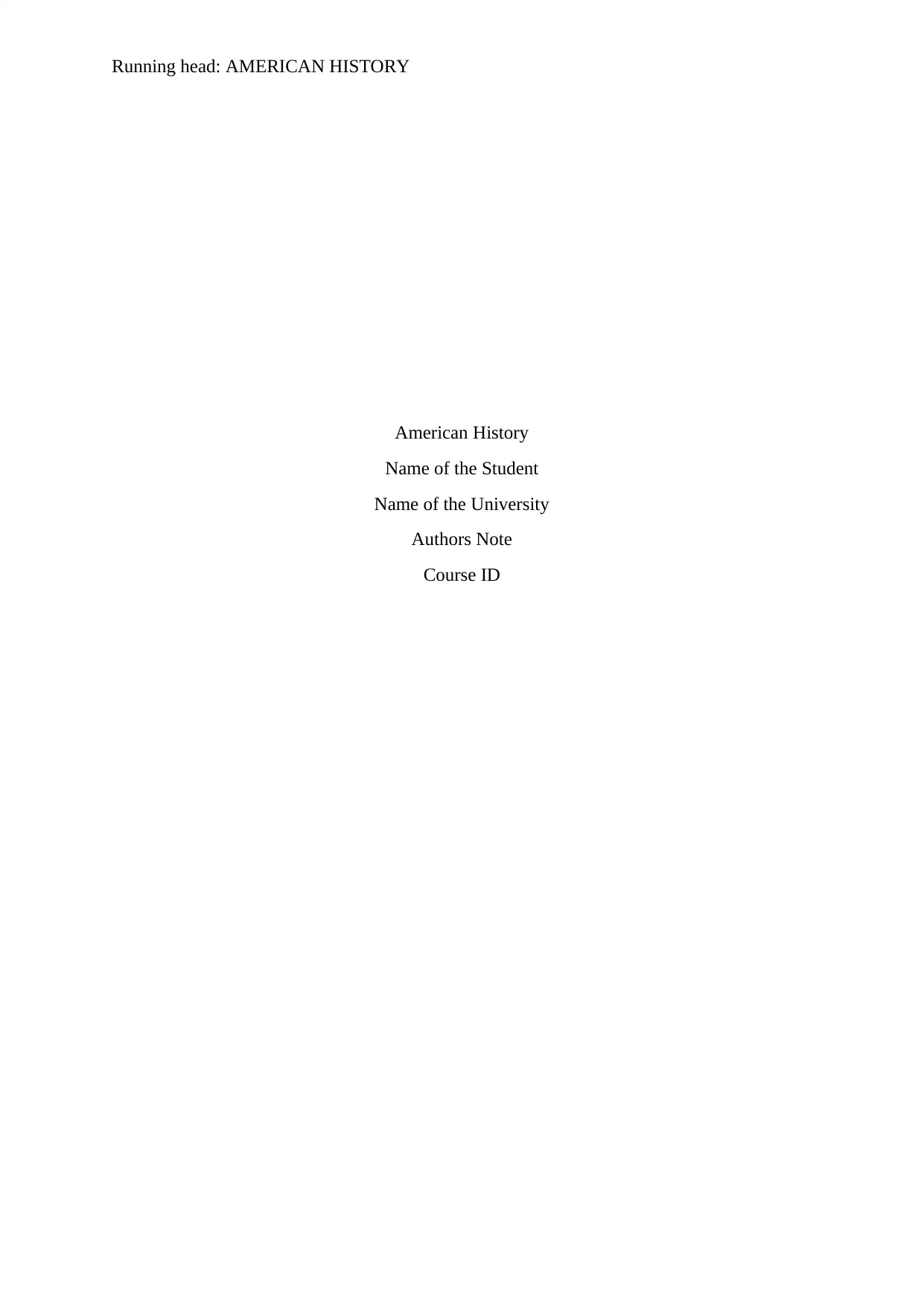
Running head: AMERICAN HISTORY
American History
Name of the Student
Name of the University
Authors Note
Course ID
American History
Name of the Student
Name of the University
Authors Note
Course ID
Paraphrase This Document
Need a fresh take? Get an instant paraphrase of this document with our AI Paraphraser
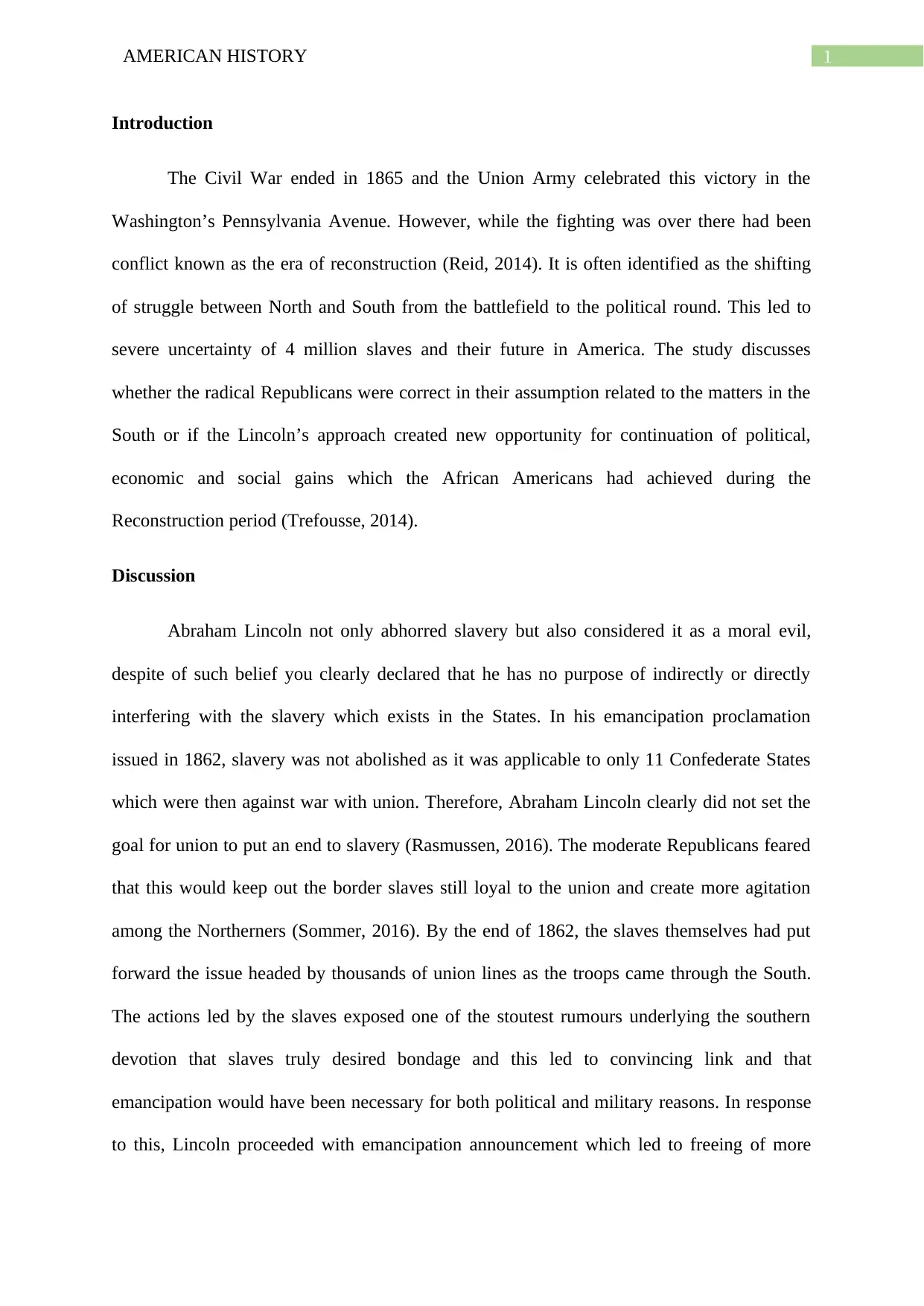
1AMERICAN HISTORY
Introduction
The Civil War ended in 1865 and the Union Army celebrated this victory in the
Washington’s Pennsylvania Avenue. However, while the fighting was over there had been
conflict known as the era of reconstruction (Reid, 2014). It is often identified as the shifting
of struggle between North and South from the battlefield to the political round. This led to
severe uncertainty of 4 million slaves and their future in America. The study discusses
whether the radical Republicans were correct in their assumption related to the matters in the
South or if the Lincoln’s approach created new opportunity for continuation of political,
economic and social gains which the African Americans had achieved during the
Reconstruction period (Trefousse, 2014).
Discussion
Abraham Lincoln not only abhorred slavery but also considered it as a moral evil,
despite of such belief you clearly declared that he has no purpose of indirectly or directly
interfering with the slavery which exists in the States. In his emancipation proclamation
issued in 1862, slavery was not abolished as it was applicable to only 11 Confederate States
which were then against war with union. Therefore, Abraham Lincoln clearly did not set the
goal for union to put an end to slavery (Rasmussen, 2016). The moderate Republicans feared
that this would keep out the border slaves still loyal to the union and create more agitation
among the Northerners (Sommer, 2016). By the end of 1862, the slaves themselves had put
forward the issue headed by thousands of union lines as the troops came through the South.
The actions led by the slaves exposed one of the stoutest rumours underlying the southern
devotion that slaves truly desired bondage and this led to convincing link and that
emancipation would have been necessary for both political and military reasons. In response
to this, Lincoln proceeded with emancipation announcement which led to freeing of more
Introduction
The Civil War ended in 1865 and the Union Army celebrated this victory in the
Washington’s Pennsylvania Avenue. However, while the fighting was over there had been
conflict known as the era of reconstruction (Reid, 2014). It is often identified as the shifting
of struggle between North and South from the battlefield to the political round. This led to
severe uncertainty of 4 million slaves and their future in America. The study discusses
whether the radical Republicans were correct in their assumption related to the matters in the
South or if the Lincoln’s approach created new opportunity for continuation of political,
economic and social gains which the African Americans had achieved during the
Reconstruction period (Trefousse, 2014).
Discussion
Abraham Lincoln not only abhorred slavery but also considered it as a moral evil,
despite of such belief you clearly declared that he has no purpose of indirectly or directly
interfering with the slavery which exists in the States. In his emancipation proclamation
issued in 1862, slavery was not abolished as it was applicable to only 11 Confederate States
which were then against war with union. Therefore, Abraham Lincoln clearly did not set the
goal for union to put an end to slavery (Rasmussen, 2016). The moderate Republicans feared
that this would keep out the border slaves still loyal to the union and create more agitation
among the Northerners (Sommer, 2016). By the end of 1862, the slaves themselves had put
forward the issue headed by thousands of union lines as the troops came through the South.
The actions led by the slaves exposed one of the stoutest rumours underlying the southern
devotion that slaves truly desired bondage and this led to convincing link and that
emancipation would have been necessary for both political and military reasons. In response
to this, Lincoln proceeded with emancipation announcement which led to freeing of more
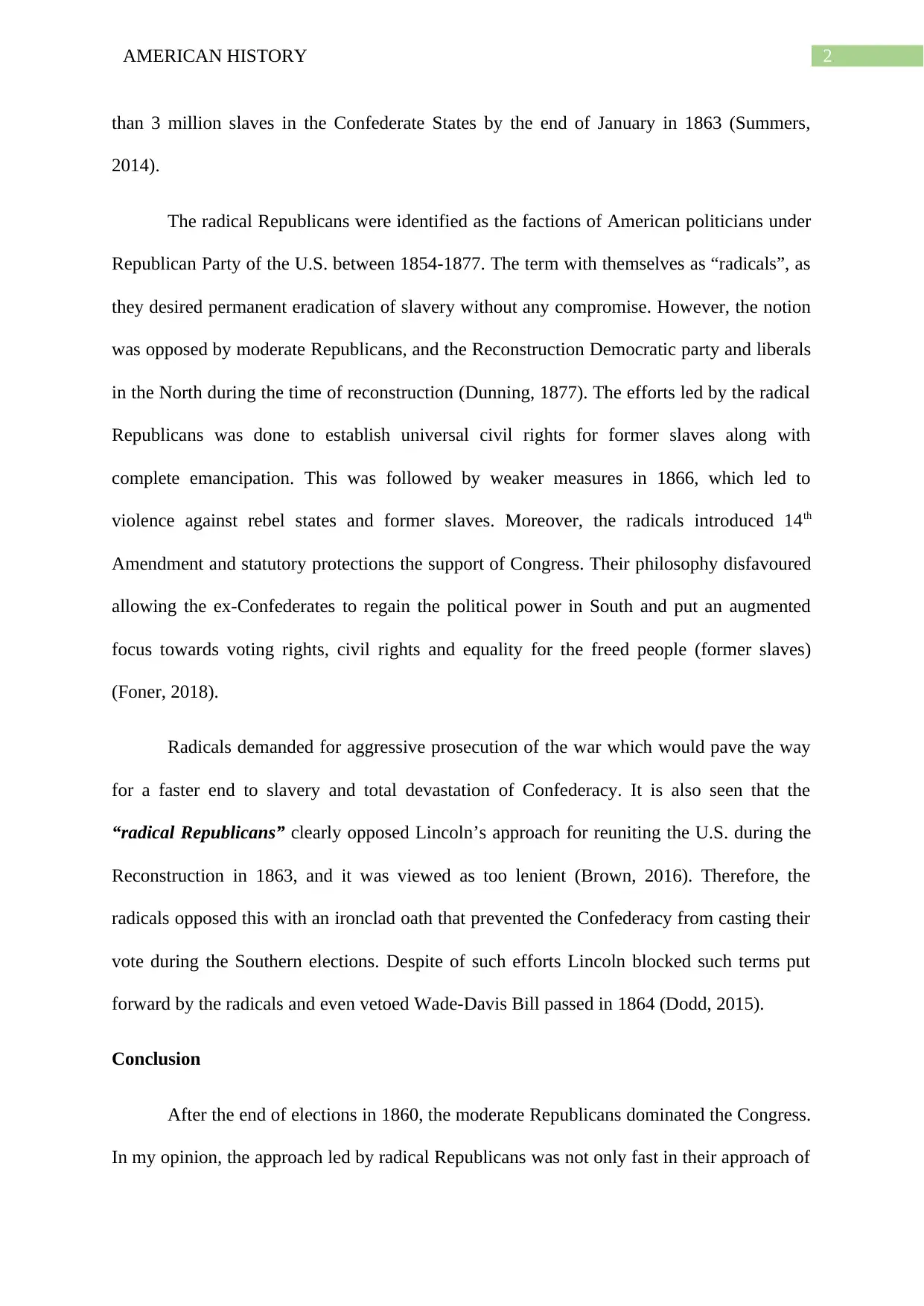
2AMERICAN HISTORY
than 3 million slaves in the Confederate States by the end of January in 1863 (Summers,
2014).
The radical Republicans were identified as the factions of American politicians under
Republican Party of the U.S. between 1854-1877. The term with themselves as “radicals”, as
they desired permanent eradication of slavery without any compromise. However, the notion
was opposed by moderate Republicans, and the Reconstruction Democratic party and liberals
in the North during the time of reconstruction (Dunning, 1877). The efforts led by the radical
Republicans was done to establish universal civil rights for former slaves along with
complete emancipation. This was followed by weaker measures in 1866, which led to
violence against rebel states and former slaves. Moreover, the radicals introduced 14th
Amendment and statutory protections the support of Congress. Their philosophy disfavoured
allowing the ex-Confederates to regain the political power in South and put an augmented
focus towards voting rights, civil rights and equality for the freed people (former slaves)
(Foner, 2018).
Radicals demanded for aggressive prosecution of the war which would pave the way
for a faster end to slavery and total devastation of Confederacy. It is also seen that the
“radical Republicans” clearly opposed Lincoln’s approach for reuniting the U.S. during the
Reconstruction in 1863, and it was viewed as too lenient (Brown, 2016). Therefore, the
radicals opposed this with an ironclad oath that prevented the Confederacy from casting their
vote during the Southern elections. Despite of such efforts Lincoln blocked such terms put
forward by the radicals and even vetoed Wade-Davis Bill passed in 1864 (Dodd, 2015).
Conclusion
After the end of elections in 1860, the moderate Republicans dominated the Congress.
In my opinion, the approach led by radical Republicans was not only fast in their approach of
than 3 million slaves in the Confederate States by the end of January in 1863 (Summers,
2014).
The radical Republicans were identified as the factions of American politicians under
Republican Party of the U.S. between 1854-1877. The term with themselves as “radicals”, as
they desired permanent eradication of slavery without any compromise. However, the notion
was opposed by moderate Republicans, and the Reconstruction Democratic party and liberals
in the North during the time of reconstruction (Dunning, 1877). The efforts led by the radical
Republicans was done to establish universal civil rights for former slaves along with
complete emancipation. This was followed by weaker measures in 1866, which led to
violence against rebel states and former slaves. Moreover, the radicals introduced 14th
Amendment and statutory protections the support of Congress. Their philosophy disfavoured
allowing the ex-Confederates to regain the political power in South and put an augmented
focus towards voting rights, civil rights and equality for the freed people (former slaves)
(Foner, 2018).
Radicals demanded for aggressive prosecution of the war which would pave the way
for a faster end to slavery and total devastation of Confederacy. It is also seen that the
“radical Republicans” clearly opposed Lincoln’s approach for reuniting the U.S. during the
Reconstruction in 1863, and it was viewed as too lenient (Brown, 2016). Therefore, the
radicals opposed this with an ironclad oath that prevented the Confederacy from casting their
vote during the Southern elections. Despite of such efforts Lincoln blocked such terms put
forward by the radicals and even vetoed Wade-Davis Bill passed in 1864 (Dodd, 2015).
Conclusion
After the end of elections in 1860, the moderate Republicans dominated the Congress.
In my opinion, the approach led by radical Republicans was not only fast in their approach of
⊘ This is a preview!⊘
Do you want full access?
Subscribe today to unlock all pages.

Trusted by 1+ million students worldwide
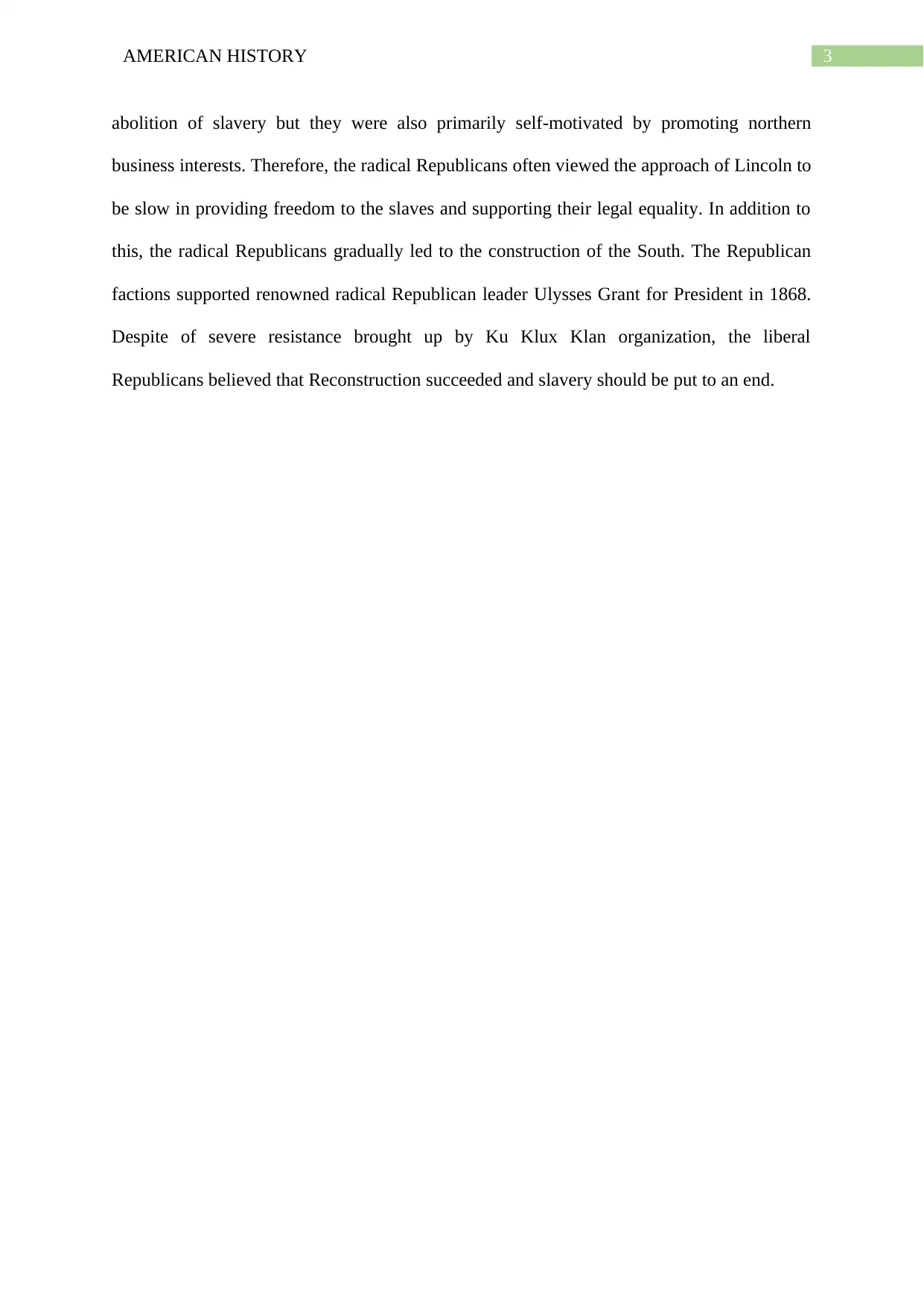
3AMERICAN HISTORY
abolition of slavery but they were also primarily self-motivated by promoting northern
business interests. Therefore, the radical Republicans often viewed the approach of Lincoln to
be slow in providing freedom to the slaves and supporting their legal equality. In addition to
this, the radical Republicans gradually led to the construction of the South. The Republican
factions supported renowned radical Republican leader Ulysses Grant for President in 1868.
Despite of severe resistance brought up by Ku Klux Klan organization, the liberal
Republicans believed that Reconstruction succeeded and slavery should be put to an end.
abolition of slavery but they were also primarily self-motivated by promoting northern
business interests. Therefore, the radical Republicans often viewed the approach of Lincoln to
be slow in providing freedom to the slaves and supporting their legal equality. In addition to
this, the radical Republicans gradually led to the construction of the South. The Republican
factions supported renowned radical Republican leader Ulysses Grant for President in 1868.
Despite of severe resistance brought up by Ku Klux Klan organization, the liberal
Republicans believed that Reconstruction succeeded and slavery should be put to an end.
Paraphrase This Document
Need a fresh take? Get an instant paraphrase of this document with our AI Paraphraser
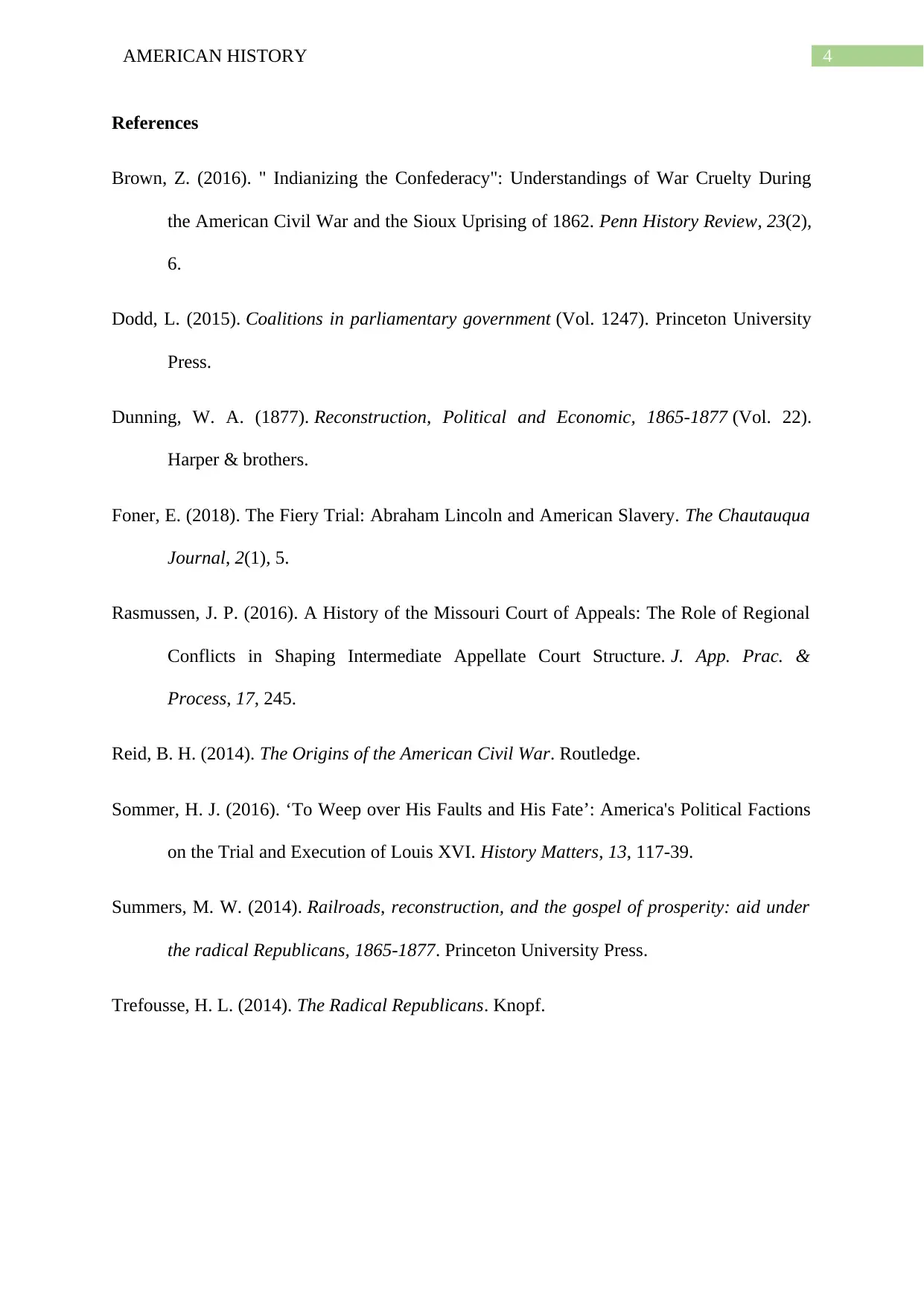
4AMERICAN HISTORY
References
Brown, Z. (2016). " Indianizing the Confederacy": Understandings of War Cruelty During
the American Civil War and the Sioux Uprising of 1862. Penn History Review, 23(2),
6.
Dodd, L. (2015). Coalitions in parliamentary government (Vol. 1247). Princeton University
Press.
Dunning, W. A. (1877). Reconstruction, Political and Economic, 1865-1877 (Vol. 22).
Harper & brothers.
Foner, E. (2018). The Fiery Trial: Abraham Lincoln and American Slavery. The Chautauqua
Journal, 2(1), 5.
Rasmussen, J. P. (2016). A History of the Missouri Court of Appeals: The Role of Regional
Conflicts in Shaping Intermediate Appellate Court Structure. J. App. Prac. &
Process, 17, 245.
Reid, B. H. (2014). The Origins of the American Civil War. Routledge.
Sommer, H. J. (2016). ‘To Weep over His Faults and His Fate’: America's Political Factions
on the Trial and Execution of Louis XVI. History Matters, 13, 117-39.
Summers, M. W. (2014). Railroads, reconstruction, and the gospel of prosperity: aid under
the radical Republicans, 1865-1877. Princeton University Press.
Trefousse, H. L. (2014). The Radical Republicans. Knopf.
References
Brown, Z. (2016). " Indianizing the Confederacy": Understandings of War Cruelty During
the American Civil War and the Sioux Uprising of 1862. Penn History Review, 23(2),
6.
Dodd, L. (2015). Coalitions in parliamentary government (Vol. 1247). Princeton University
Press.
Dunning, W. A. (1877). Reconstruction, Political and Economic, 1865-1877 (Vol. 22).
Harper & brothers.
Foner, E. (2018). The Fiery Trial: Abraham Lincoln and American Slavery. The Chautauqua
Journal, 2(1), 5.
Rasmussen, J. P. (2016). A History of the Missouri Court of Appeals: The Role of Regional
Conflicts in Shaping Intermediate Appellate Court Structure. J. App. Prac. &
Process, 17, 245.
Reid, B. H. (2014). The Origins of the American Civil War. Routledge.
Sommer, H. J. (2016). ‘To Weep over His Faults and His Fate’: America's Political Factions
on the Trial and Execution of Louis XVI. History Matters, 13, 117-39.
Summers, M. W. (2014). Railroads, reconstruction, and the gospel of prosperity: aid under
the radical Republicans, 1865-1877. Princeton University Press.
Trefousse, H. L. (2014). The Radical Republicans. Knopf.
1 out of 5
Related Documents
Your All-in-One AI-Powered Toolkit for Academic Success.
+13062052269
info@desklib.com
Available 24*7 on WhatsApp / Email
![[object Object]](/_next/static/media/star-bottom.7253800d.svg)
Unlock your academic potential
Copyright © 2020–2026 A2Z Services. All Rights Reserved. Developed and managed by ZUCOL.





